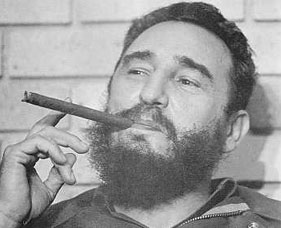Fidel Castro

"Capitalism has neither the capacity, nor the morality, nor the ethics to solve the problems of poverty."
- Fidel Castro
Fidel Castro, born August 13, 1926, served as the leader of Cuba, a poor underdeveloped country, from 1959-1976. He was a Marxist-Leninist thinker and social-communist revolutionary. Studying law and politics at the University of Havana, he quickly formed these political ideologies. These ideas matured after joining The Party of the Cuban People. Whilst running for elections, General Fulgencio Batista established a dictatorship throughout Cuba. Castro joined in an armed revolution to try and overthrow the unpopular dictator. In January of 1959, Batista fled the country and Castro overtook the position of leader of Cuba. In accordance with his Marxist-Leninist thinking, he opposed US influence and their socialist ideology, and this created a collision between the neighbouring countries.
During the Cold War, the Soviet Union proposed to Castro a plan to strike the US from Cuba. Castro, who has had large involvement in guerilla battles, agreed to the plan. This operation is now known as the Cuban Missile Crisis. The outcome of the event was the removal of all missiles from Cuba, and the US guarantee not to invade the country.
Castro could now fully develop and implement his political communist ideas without fear of US influence or invasion.
To go back to the main leaders page, click here
